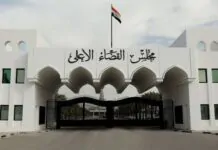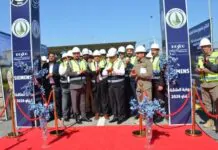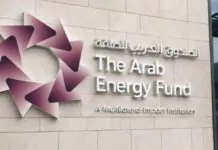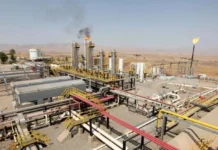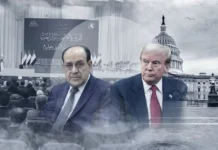Tishwash: Head of the Iraqi Private Banks Association: Arab and foreign investments in Iraq reached $63 billion in two years.
The head of the Iraqi Private Banks Association, Wadih Al-Handhal, announced that the Union of Arab Banks will hold its next conference in the capital, Baghdad, under the patronage of Iraqi Prime Minister Mohammed Shia Al-Sudani, in cooperation with the Central Bank of Iraq and the Iraqi Private Banks Association.
In his speech at the Union of Arab Banks conference currently being held in Cairo, under the title of Public-Private Partnership, Al-Handhal said, “The current Iraqi government has taken a major role in achieving public-private partnerships, starting with the establishment of the Private Sector Council.”
He noted that the private banking sector has begun to expand significantly following the partnership with the government, represented by the expansion of electronic payments and government institutions contracting with companies and banks to develop the infrastructure for government electronic payments.
He added that electronic payments via bank cards in 2024 reached more than 21.1 trillion dinars, through more than 58.4 million transactions, compared to just over 7,000 transactions in 2017. This represents a significant development.
He stressed that the volume of Arab and foreign investments in Iraq over the past two years reached $63 billion, and this came as a result of the partnership between the government and the private sector.
He explained that the development path represents a major gateway to public-private partnerships, and that everyone can participate in this project, which contributes to the development of Iraq’s gross domestic product. link
************
Tishwash: MP: Parliament will resume its sessions normally within the next two days – Urgent
Member of Parliament Jawad Al-Yasari confirmed, on Monday (April 28, 2025), that the Iraqi Parliament will resume its sessions normally within the next two days.
The leftist told Baghdad Today, “The House of Representatives will resume its sessions within the next two days, and there is a determination and will to do so from the House Presidency, and there is an understanding with the parliamentary blocs, with the aim of exploiting the last months of the House’s term to pass important laws.”
He added that “any controversial law will not be put on the agenda without prior agreement between the parliament’s presidency and the leaders of the parliamentary blocs to ensure that sessions are not disrupted, as has happened in the past period.” He indicated that “in the coming hours, a date will be set for the resumption of weekly sessions as normal.”
Last Saturday, the Parliamentary Legal Committee confirmed that the term of the Iraqi Parliament’s legislative and oversight body had “expired.”
Committee member Mohammed Anouz told Baghdad Today, “The Iraqi parliament’s legislative and oversight role has come to an end due to a political will to obstruct the council’s work until the next parliamentary elections. This session has been deliberately obstructed by political disputes since the beginning of the session and continues to this day.”
He explained that “there is a deliberate attempt to keep the House of Representatives inactive so as to prevent requests for interpellation and accountability for some officials who enjoy political and partisan protection, as well as to obstruct the passage of some laws so that they remain a bargaining chip and blackmail tool in the hands of some political parties during the coming period. That is why we say that the life of the legislative and oversight council has ended because of these influential political parties.”
The scene of a parliament in limbo or in session has become a part of political life in Iraq. Citizens may have grown accustomed to this recurring pattern, or may consider themselves unconcerned with what transpires within the parliament, which could translate into a reluctance to participate in or a boycott of the upcoming parliamentary elections. link
************
Tishwash: The Finance Committee discusses oil price fluctuations and the regulatory law with international partners.
On Monday, April 28, 2025, the Parliamentary Finance Committee discussed the fluctuations in oil prices and their impact on the budget, with the International Partners Foundation, and with the participation of experts, consultants, university professors and official bodies, in an important workshop to discuss the proposed law for the first amendment to the Federal Revenue Control and Allocation Authority Law No. (55) of 2017.
The House of Representatives’ media office said in a statement received by Al-Jabal that it “held an expanded two-day workshop to discuss ways to maximize revenues, in cooperation with the International Partners Foundation, with the participation of experts, consultants, university professors, and relevant official bodies.”
Committee Chairman Atwan Al-Atwani noted that “over time and the increasing complexity of the economic landscape have demonstrated the need to review, update, and amend the Authority’s legal framework.” He explained that “the Finance Committee in the House of Representatives is currently leading a significant legislative effort aimed at introducing the first amendment to Law No. 55 of 2017, a move that reflects an awareness that the law in its current form may not be sufficient to address emerging challenges or fully achieve the ambitious goals set for the Authority.”
The International Partners Foundation presented a presentation by Mr. Ken McIntosh and Lord Jeremy Purves, highlighting the most prominent problems and challenges facing the Iraqi economy. They presented the Foundation’s vision for overcoming these obstacles, emphasizing the Commission’s pivotal role in monitoring and overseeing the allocation of revenues to achieve financial stability and enhance transparency.
According to the statement, “The proposed first amendment, which the House of Representatives completed its first reading, aims to address challenges and enhance the Authority’s role through several axes addressed in the interventions and discussions during the workshop, most notably the Authority’s role in verifying the fair distribution of revenues when preparing the draft federal general budget, and the accuracy of calculating allocations according to principles and standards determined by a special and precise system.
Approaching the relevant authorities to provide the Authority with the necessary information and documents to enable it to perform its duties effectively. Investigating and investigating to accurately determine the sources and components of federal revenues.”
The workshop also included hosting representatives of ministries to exchange advice and opinions, with a focus on the importance of expanding the authority’s mandate to include evaluating the performance and financial effectiveness of government institutions, in addition to the need to clearly define the authority’s powers to avoid overlapping tasks with other institutions, according to the statement.
The workshop’s primary objective, according to the statement, was to “consult and gather input from key stakeholders, including representatives of federal ministries, the regional and local governments, financial and legal experts, and representatives of the International Partners Foundation, on the proposed draft amendment.
The workshop also sought to develop the draft amendment based on the comments and suggestions submitted, with the aim of finalizing it before presenting it for a second reading in the House of Representatives. Additionally, it explored how to enable the Commission to carry out its expanded mandate efficiently and effectively.” link


